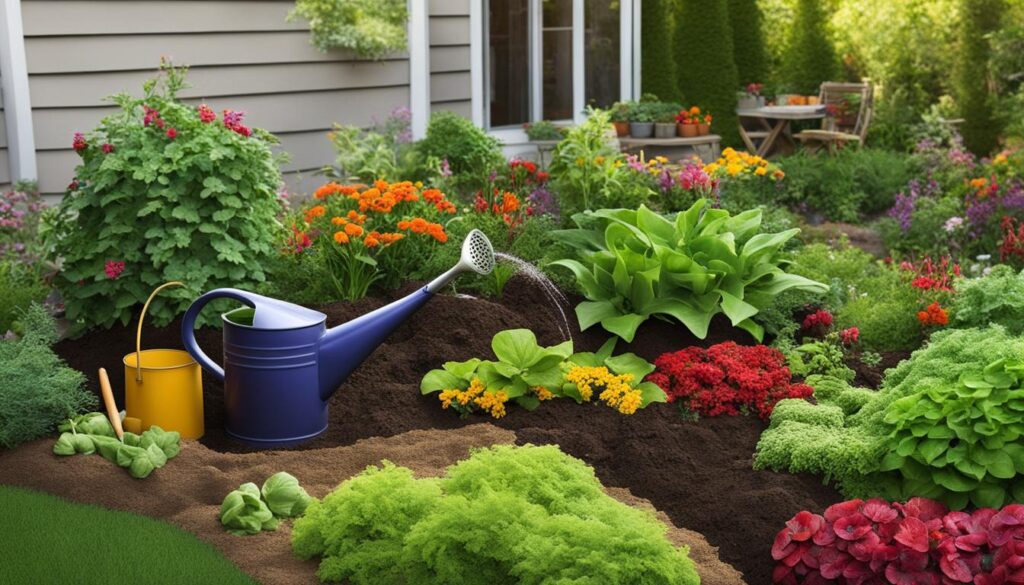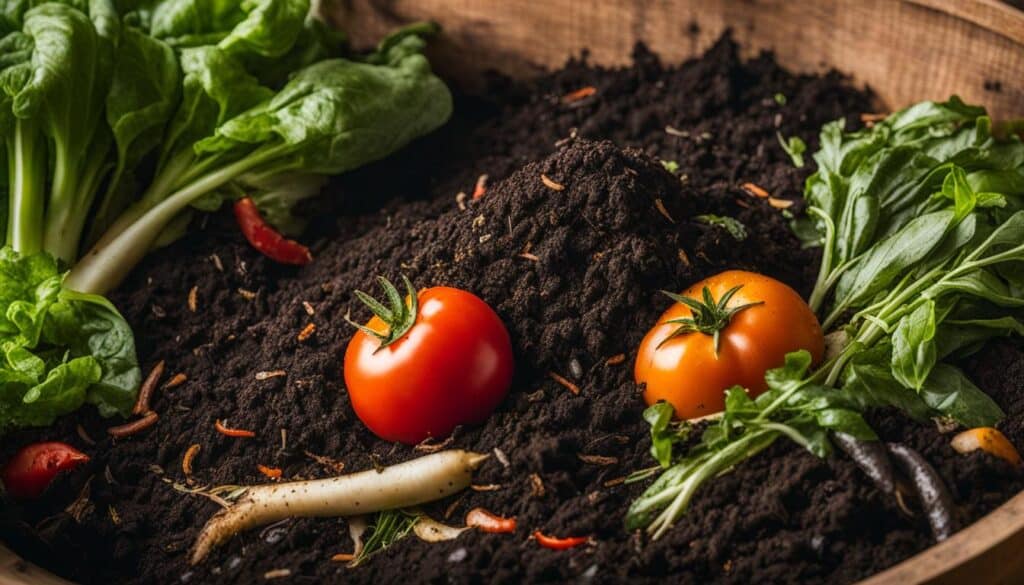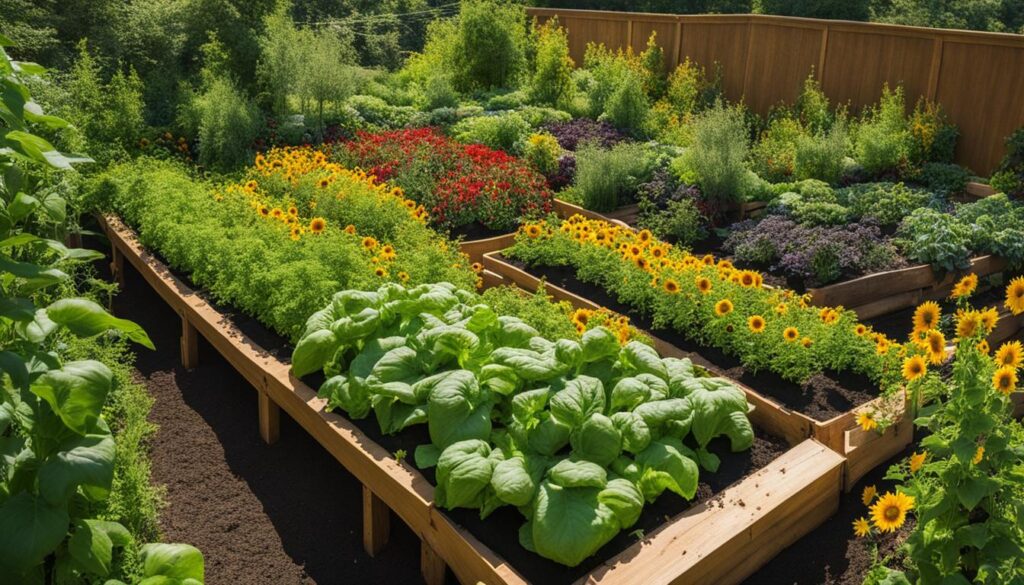Compost tea is a powerful organic fertilizer that can revolutionize your gardening practices. It is a nutrient-rich liquid that enhances soil health, reduces waste, and promotes plant growth. By harnessing the power of compost tea, we can create a thriving garden that is sustainable and eco-friendly. Let’s explore the benefits and learn how to make and use it to maximize its potential.
Why Compost Tea:
- Compost tea is a nutrient-rich liquid fertilizer that enhances soil health and promotes plant growth.
- It is a sustainable and eco-friendly alternative to chemical fertilizers.
- Compost tea contains beneficial microbes that improve soil structure and provide essential nutrients to plants.
- Applying the compost extract correctly can maximize its potential and benefit your garden in various ways.
- Avoid common mistakes such as using low-quality compost or overloading with additives when making and using compost tea.
For More Information On the Different Types Of Compost Read This: Different Types Of Compost To Enrich Your Soil
Compost Tea Explained
In the world of organic gardening, compost tea is a popular and effective natural fertilizer. But what exactly is compost tea? Simply put, it is a liquid solution made by steeping compost in water. This process allows the nutrients and beneficial microorganisms present in the compost to be extracted, resulting in a nutrient-rich mixture that can be applied to the soil.
The magic of this liquid lies in its microbial activity. When compost is steeped in water, it releases beneficial microorganisms such as bacteria and fungi. These microorganisms play a vital role in enhancing soil health by breaking down organic matter, improving soil structure, and aiding in nutrient availability for plants. The microbial activity in this liquid not only provides essential nutrients to plants but also helps to suppress harmful pathogens and pests, creating a healthier growing environment.
Compost tea is a natural alternative to chemical fertilizers, making it a favorite among organic gardeners. Its use promotes sustainable farming practices by reducing waste and utilizing the power of beneficial microbes. By incorporating this liquid into your gardening routine, you can nourish your plants, improve soil health, and cultivate a thriving garden ecosystem.
The Benefits of Compost Tea
Compost tea offers a wide range of benefits for your garden and the environment. Let’s explore some of its key advantages:
- Promotes plant nutrition: Compost tea provides essential nutrients to plants, helping them grow stronger and more resilient. It nourishes plants with a balanced blend of macro and micronutrients, promoting healthy foliage, vibrant blooms, and abundant harvests.
- Enhances soil health: By increasing organic matter, improving soil structure, and enhancing nutrient retention, compost tea enriches the soil and creates a thriving environment for beneficial microbes. This leads to improved soil fertility, water retention, and overall soil health.
- Supports sustainable farming: Organic gardeners and sustainable farmers rely on compost extract as a natural alternative to chemical fertilizers. It reduces reliance on synthetic inputs, minimizes environmental impact, and helps build a resilient, self-sustaining ecosystem.
- Boosts beneficial microbes: Compost tea is a microbial powerhouse, teeming with beneficial bacteria and fungi. When applied to the soil, it increases the population and diversity of these microbes, which in turn suppresses the growth of harmful pathogens and pests.
Incorporating compost tea into your gardening routine can revolutionize your approach to plant care. Its numerous benefits make it a valuable tool for organic gardening, promoting plant nutrition, soil health, and sustainable farming practices.
Unlocking the Power of Compost Tea
To fully harness the benefits of compost tea, it’s important to understand its potential applications and how to use it effectively. By incorporating this organic tea into your garden care routine, you can:
- Apply it as a soil drench or foliar spray to deliver nutrients directly to plants and enhance their overall health.
- Use it as a seed soak to promote germination and provide young plants with a nutritious start.
- Inoculate potting soil with compost tea to create a fertile growing medium for container plants.
- Revive weak or stressed plants by applying cthe liquid to boost their vigor and resilience.
Experiment with different recipes and application methods to find the approach that works best for your garden. Embrace the power of compost tea and witness the transformative effects it can have on your plants and soil.
| Benefit | Description |
|---|---|
| Promotes plant nutrition | Compost tea provides essential nutrients to plants, promoting healthy growth and abundant harvests. |
| Enhances soil health | By improving soil structure and increasing organic matter, compost tea enriches the soil and supports beneficial microbial activity. |
| Supports sustainable farming | Organic gardeners and sustainable farmers rely on compost tea as a natural and eco-friendly alternative to chemical fertilizers. |
| Boosts beneficial microbes | Compost tea increases the population of beneficial bacteria and fungi in the soil, suppressing harmful pathogens and pests. |
How to Make Compost Tea
Compost tea is a simple and effective way to enhance the health and fertility of your soil. By following a few easy steps, you can create a nutrient-rich tea that will benefit your plants and promote sustainable gardening practices.
Here is a step-by-step guide on how it is made:
Gather the necessary supplies
- A bucket
- Water
- Compost
- A compost tea bag or mesh cloth
- An air pump
- A catalyst such as kelp or bone meal
Fill the bucket with water to about three-quarters full. Add the catalyst, such as a small handful of kelp or bone meal, to the water. This will provide additional nutrients for the microorganisms in the compost tea.
Place the compost tea bag or a mesh cloth filled with compost into the bucket of water. Make sure the compost is well moistened but not soaked. The compost tea bag or mesh cloth will prevent the compost from mixing with the water while allowing the beneficial microorganisms to brew.
Set up the air pump to circulate the water. This will ensure that the compost tea is properly aerated, creating the ideal conditions for the growth of beneficial microbes. Let the liquid steep for at least 24 hours, although longer steeping times can yield a more potent brew.
Applying compost tea to your garden
After the steeping period, remove the compost tea bag or mesh cloth from the bucket. You can then apply the compost tea to your garden in a few different ways:
- Soil drench: Pour the compost tea directly onto the soil around the base of your plants. This will deliver the nutrients and beneficial microorganisms directly to the roots.
- Foliar spray: Use a spray bottle or a pump sprayer to apply the compost tea directly onto the leaves of your plants. This method allows the nutrients to be absorbed through the foliage, providing an extra boost to plant health.
- Seed soaking: Soak your seeds in compost tea before planting them. This will help to inoculate the seeds with beneficial microorganisms, giving them a head start in their growth.
Remember to apply the organic liquid regularly to maintain a healthy garden. You can use it as part of your regular watering routine or apply it as needed, depending on the specific needs of your plants.
| Supplies | Instructions |
|---|---|
| A bucket | Fill with water |
| Water | Fill the bucket about three-quarters full |
| Compost | Place in a compost tea bag or mesh cloth |
| Compost tea bag or mesh cloth | Submerge in the bucket of water |
| An air pump | Set up to circulate the water |
| A catalyst (e.g., kelp, bone meal) | Add a small handful to the water |
| Steeping time | Let the liquid tea steep for at least 24 hours |
Compost Tea Recipes
When it comes to making compost tea, there are numerous recipes and variations that you can try to suit your specific gardening needs. Experimenting with different ingredients can enhance the effectiveness of your composting tea and provide additional benefits for your plants. Here are a few popular additives that you can consider:
- Molasses: Adding molasses to your compost tea can provide a food source for the beneficial microbes, helping them thrive and multiply.
- Seaweed extract: Seaweed is rich in trace minerals and growth-promoting compounds, making it a great addition to compost tea for plant nutrition and overall vitality.
- Fish emulsion: Fish emulsion is a natural fertilizer that is high in nitrogen, phosphorus, and potassium. It can contribute to the nutrient content of your composting tea.
- Rock dust: Rock dust is a natural mineral powder that contains a wide range of trace elements. Adding it to your organic liquid it can enhance the nutrient profile and improve soil health.
Feel free to experiment with these ingredients and adjust the quantities to find the recipe that works best for your garden. Remember to source high-quality materials and follow the proper guidelines to ensure the success of your compost tea.
| Additives | Benefits |
|---|---|
| Molasses | Provides a food source for beneficial microbes |
| Seaweed extract | Rich in trace minerals and growth-promoting compounds |
| Fish emulsion | High in nitrogen, phosphorus, and potassium |
| Rock dust | Contains a wide range of trace elements |
Remember, compost tea is a versatile tool that can be customized to meet the unique needs of your garden. Whether you’re looking to boost plant nutrition, improve soil health, or enhance overall growth, compost extract can be your secret weapon for sustainable and organic gardening.
Maximizing Compost Tea’s Potential
Compost tea is a powerful tool in organic gardening, providing numerous benefits to soil health and plant nutrition. To maximize its potential, it is essential to apply the compost extract correctly. Here are some tips on how to do so:
1. Proper Application
When using compost tea, it is important to remove the tea bag or mesh cloth from the brew before application. Distribute the mixture evenly around the soil in your garden, ensuring that it reaches the root zone of your plants. Additionally, you can use the tea like liquid as a foliar spray by lightly coating the leaves. This allows the nutrients to be absorbed directly by the plant, enhancing its growth and vitality.
2. Regular Application
For optimal results, it is recommended to apply the tea regularly. This ensures a constant supply of essential nutrients and beneficial microbes to your garden. Depending on the needs of your plants, you can apply it every one to two weeks. However, it is important to avoid over-applying, as excessive amounts can lead to nutrient imbalances in the soil.
3. Timing
Timing is crucial when applying compost tea. It is best to apply the tea in the early morning or late afternoon when the temperatures are cooler. This allows the beneficial microbes in the tea to establish themselves in the soil before the heat of the day. Avoid applying it during periods of heavy rain, as it can wash away the nutrients before they have a chance to be absorbed by the plants.
4. Consistency
Consistency is key when using compost tea. Incorporate it into your regular gardening routine to maintain a healthy and thriving garden. By consistently applying the liquid, you will provide a continuous supply of nutrients and beneficial microbes that will support the overall health and vigor of your plants.
By following these guidelines, you can maximize the potential of this organic liquid and enjoy the benefits of healthier plants and improved soil health in your garden.
| Benefit | Tips |
|---|---|
| Proper Application | – Remove tea bag or mesh cloth – Distribute evenly around soil – Use as a foliar spray |
| Regular Application | – Apply every 1-2 weeks – Avoid over-application |
| Timing | – Apply in the early morning or late afternoon – Avoid heavy rain |
| Consistency | – Incorporate into regular gardening routine |
Common Mistakes When Using Compost Tea
When it comes to using compost tea, there are a few common mistakes that gardeners should avoid in order to maximize the benefits of this powerful organic fertilizer. One of the most significant mistakes is using low-quality compost that may contain pathogens or weed seeds. It is crucial to use high-quality compost that has been properly processed to ensure that it is free from harmful substances.
Another mistake to avoid is overloading the compost liquid with additives. While it may be tempting to add extra ingredients for a boost, it is important to maintain a balanced nutrient composition. Overloading the tea can ultimately result in an unbalanced mixture that may not provide the optimal nutrition for your plants.
In addition to using high-quality compost and avoiding excessive additives, it is crucial to properly aerate the organic liquid. Without proper aeration, the tea can become anaerobic, meaning it lacks oxygen, which can harm your plants. Be sure to follow the proper guidelines for aerating your compost tea to promote a healthy, oxygen-rich environment for the beneficial microbes.
Common Mistakes When Using Compost Tea:
- Using low-quality compost that may contain pathogens or weed seeds
- Overloading the organic liquid with additives, resulting in an unbalanced nutrient composition
- Not properly aerating the compost extract, leading to anaerobic conditions
| Mistake | Impact | Solution |
|---|---|---|
| Using low-quality compost | Potential contamination and poor plant health | Use high-quality compost that has been properly processed |
| Overloading the tea with additives | Unbalanced nutrient composition | Maintain a balanced nutrient profile and avoid excessive additives |
| Not properly aerating the tea | Anaerobic conditions harmful to plants | Ensure proper aeration according to guidelines |
Remember, using compost tea can be a powerful tool for your garden, but it is important to avoid these common mistakes. By using high-quality compost, maintaining a balanced nutrient composition, and properly aerating the tea, you can maximize the benefits and promote healthy plant growth.
Different Applications for Compost Tea
Compost tea is a versatile tool that can be applied in various ways to benefit your garden. In addition to using it as a soil drench or foliar spray, there are several other creative applications for composting tea.
Soaking Seeds:
One option is to soak your seeds in the tea before planting. This can help kickstart germination and provide young seedlings with an extra boost of nutrients and beneficial microbes. Simply place the seeds in a container filled with the liquid and let them soak for a few hours or overnight before planting.
Inoculating Potting Soil:
When starting seeds or transplanting seedlings into pots, you can mix the liquid into the potting soil to inoculate it with beneficial microbes. This helps establish a healthy root system and provides a nutrient-rich environment for your plants to thrive.
Reviving Weak or Stressed Plants:
If you have plants that are struggling or showing signs of stress, compost tea can be used as a tonic to revive them. Apply a diluted mixture of the tea around the base of the plants, allowing the nutrients and microbes to nourish the roots and promote recovery.
By exploring different applications for this organic liquid, you can fully utilize its benefits and cater to the specific needs of your garden. Whether it’s soaking seeds, inoculating potting soil, or reviving weak plants, composting tea offers a natural and sustainable solution for promoting overall plant health and vitality.
The Science Behind Compost Tea
Compost tea is not just a simple nutrient-rich liquid; it’s a powerful elixir that works its magic through the science of beneficial microorganisms. When compost is steeped in water, these microorganisms are released in high concentrations, creating a solution that is teeming with life. These beneficial microbes, including bacteria and fungi, play a crucial role in enhancing plant nutrition, soil health, and overall plant vitality.
One of the key benefits of this type of composting is its ability to promote microbial activity in the soil. The microorganisms present in the tea help break down organic matter more effectively, releasing essential nutrients that are readily available for plants to absorb. This enhanced microbial activity also improves soil structure, allowing for better water retention and root development. As a result, plants grown in soil treated with compost tea are better equipped to withstand environmental stressors and achieve optimal growth.
Furthermore, compost tea provides a boost of nutrients to plants, enriching the soil and promoting healthy growth. The microbes within the tea break down organic matter into simpler forms, making it easier for plants to uptake the necessary nutrients. This natural process mimics the way nutrients are released in healthy, balanced ecosystems, resulting in stronger and more resilient plants. This amazing liiquid also helps establish a diverse and robust microbial community in the soil, which aids in suppressing plant diseases and pests, further contributing to plant health and resilience.
Overall, the science behind compost tea underscores its effectiveness as a sustainable and eco-friendly solution for organic gardening. By harnessing the power of beneficial microorganisms, it also enhances plant nutrition, soil health, and microbial activity in a natural and holistic way. Incorporating this amazing liquid into your gardening practices can lead to healthier plants, higher yields, and a more sustainable approach to farming.
Table: Key Benefits of Compost Tea
| Benefit | Description |
|---|---|
| Promotes microbial activity | The microorganisms in compost tea enhance the breakdown of organic matter, releasing essential nutrients and improving soil structure. |
| Enhances plant nutrition | Compost tea provides a rich source of nutrients that are readily available for plant absorption, resulting in healthy growth and higher yields. |
| Suppresses pests and diseases | The diverse microbial community promoted by compost tea helps suppress plant diseases and pests, reducing the need for chemical interventions. |
| Improves soil health | Compost tea increases organic matter content, improves soil structure, and enhances water retention, creating an ideal environment for plants to thrive. |
| Promotes sustainable farming | By reducing the reliance on chemical fertilizers and pesticides, this tea offers a sustainable and eco-friendly approach to gardening and farming. |
For More Composting Articles Clink The Links Below
Conclusion
We have explored the numerous benefits of using compost tea in organic gardening and sustainable farming practices. The power of this organic liquid lies in its ability to improve soil health, provide essential nutrients to plants, and promote beneficial microbial activity. By incorporating this into your gardening routine, you can create a thriving garden ecosystem that is both environmentally friendly and productive.
Compost tea offers a natural alternative to chemical fertilizers, reducing the reliance on synthetic inputs and minimizing the impact on the environment. With its rich microbial content, this tea helps to suppress pests and diseases, allowing plants to grow healthier and stronger. It also enhances soil structure, increasing nutrient retention and reducing soil erosion.
To maximize the potential of compost tea, it is important to follow the proper guidelines for making and using it. Use high-quality compost and avoid overloading the tea with additives. Remember to aerate the liquid properly to maintain aerobic conditions. Regularly apply liquid tea to ensure a constant supply of nutrients and beneficial microbes to your garden.
Incorporating compost tea into your gardening practices is a powerful way to nourish your plants, enhance soil health, and contribute to a more sustainable and eco-friendly future. Embrace the magic of composting tea and experience the transformative effects it can have on your plants and soil. Happy gardening!
FAQ
What is compost tea?
Compost tea is a nutrient-rich liquid made by steeping compost in water. It is teeming with beneficial microorganisms that enhance soil health and promote plant growth.
What are the benefits of compost tea?
Compost tea improves soil health, provides essential nutrients to plants, boosts beneficial microbial populations, suppresses pests and diseases, and reduces waste.
How do I make compost tea?
To make compost tea, you will need water, compost, a compost tea bag or mesh cloth, an air pump, and a catalyst. Fill a bucket with water, add the catalyst, place the tea bag or mesh cloth filled with compost in the water, set up the air pump to circulate the water, and let it steep for at least 24 hours.
Are there different recipes for compost tea?
Yes, there are various recipes and variations for making compost tea. Popular additives include molasses, seaweed extract, fish emulsion, and rock dust. Experiment with different ingredients to find the recipe that works best for your garden.
How should I apply compost tea?
You can apply compost tea by distributing it around the soil in your garden or using it as a foliar spray, lightly coating the leaves. Apply the organic liquid regularly to ensure a constant supply of nutrients and beneficial microbes to your garden.
What are common mistakes to avoid when using it?
Common mistakes include using low-quality compost, overloading the compost tea with additives, and not aerating the liquid properly. It is important to use high-quality ingredients and follow proper guidelines to maximize the effectiveness of compost tea.
What are the different applications for compost tea?
Compost tea can be used as a soil drench, foliar spray, seed soak, potting soil inoculant, and to revive weak or stressed plants. Its versatility makes it a valuable tool for all aspects of gardening.
How does composting tea work?
Composting tea works by releasing beneficial microorganisms into the soil, providing essential nutrients, improving soil structure, and stimulating microbial activity. These actions enhance plant nutrition, soil health, and overall plant vitality.



